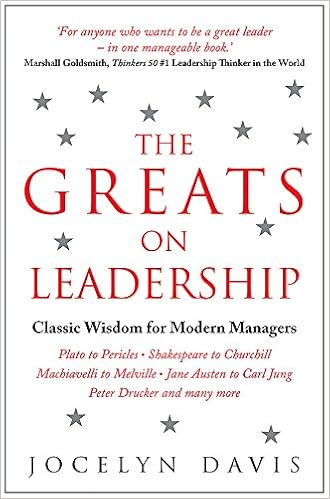
Greats on Leadership is a rich and fascinating book that belongs on the bookshelf of all students of leadership. But a better place is in your briefcase, as it is loaded with ideas and tools to apply in preparing for your next leadership engagement, and frameworks to help you process what you’ve learned and continuously improve your effectiveness as you go.
Most leadership books that you might pick up at an airport bookstore have a catchy title, a simple model and compelling stories for getting the key points across. This one is different. Davis has done the “heavy lifting” to sort through the leadership literature through the ages to create a feast of examples and insights to be savored over time. In fact, each of the 24 chapters could be fleshed out into a stand-alone book that provides plenty of useful guidance.
When I first saw the title, I admit that the dreaded “A-word” came to mind. That is – “academic” -- which is business code for “irrelevant.” And then I read a few chapters and discovered, happily, that it is highly applicable to today’s business challenges, and the writing is clear and engaging.
Davis reminds us that leadership wasn’t discovered by today’s generation. While every company and organization on the planet seems to yearn for better leadership, it was always so. Better still, she puts leadership in a broad context – from Moses to Lincoln, and Churchill to Lau Tzu -- in a way that helps us understand how great leaders think and what they do.
Beyond the preface and introduction, don’t feel the need to read it page by page. I suggest starting with one of four leadership domains: politics, battles, minds, and judgments; or people of most interest (Machievelli, Melville, Shaw). Or you might start with more recent thinkers, like Marshall Goldmith, and trace their intellectual roots -- to Shakespeare, no less!
As a psychologist, I was drawn to the section on “minds” and was particularly struck by Victor Frankl’s observations on the importance of human meaning, drawn from his experience in surviving the Holocaust. There are powerful lessons for leaders facing the more mundane challenge of increasing employee engagement by creating meaning, versus focusing on tangible rewards and incentives.
While the challenges of leadership are daunting, Davis reminds us that students of leadership have many tall shoulders on which to stand. Read this book carefully and apply it thoughtfully, and some day others might be glad to stand on yours.
No comments:
Post a Comment